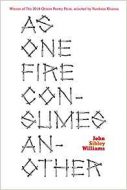 John Sibley Williams
John Sibley Williams
As One Fire Consumes Another
Orison Books
Reviewer: Ace Boggess
There is something exceedingly familiar about reading John Sibley Williams’s newest collection, As One Fire Consumes Another, a sense of nostalgia arising as one turns the pages and sees these poems laid out neatly in narrow columns. It’s a flashback to the days of reading newspapers when the daily edition was a part of everyone’s life. Williams’s poems have that newsy sort of feel as well. Sometimes leaning toward the narrative, other times toward the confessional, and often toward the political, they create a sense of attunement to the world: this modern world with its flaws but also its unique heart. Williams examines life today, then offers hope for change, growth, or a shared understanding.
The first section sets the tone with its title: “Harm,” suggesting that there will be a deep, abiding sadness in these poems as well as struggle for identity, peace, and overcoming. This plays out right away, as in these lines from “Of Milk & Honey”:
… Sure, my
grandfather knifed your grandfather
in the cargo hold of some vast ship
heading vaguely west. But isn’t
experience merely what men call
their mistakes? The rest is history or
myth or rinse and repeat.
Williams continues to develop this theme in “I Sometimes Forget This Isn’t About Us,” an urgent lesson in which bleak stories pit the “yes, we can be better than this” against the “some kinds of people have it coming.” Another related poem is “Sundogs,” dedicated to Charlottesville, in which Williams offers the powerful closing line: “Whatever we think they stand for, / the old gods are toppling.”
More than just reporting the news, however, the narrators of these poems are engaged in a spiritual search for answers. There are references to the old gods, lesser gods, and new gods speaking in the same tone as the old. Clearly Williams wants the reader to take this journey with him into an exploration of causality, questioning all beliefs along the way (without judging those beliefs), hopefully to better understand how truth has been so obscured and decency so twisted that, as he says in “Harm,” “We are less afraid of the dark / inside than all of the light.”
If the first section of the book equates to a newspaper’s front page, exploring in depth all the bad news, then the second, “Keeping the Old World Lit,” is akin to the community or local section. It is more meditative and thought-provoking. It looks at the past as fact rather than some golden dream. Section II has a more playful side, also. Consider, for example, the opening to “Everests”:
Tell me of wheat bent by aliens
again. The thimbleful of truth in
every incredible story. How old
stones roughly dispersed over miles
of rough Spanish coast are remains
of a refuge. A once-mighty city lives
in my lungs. I tell people the world
is big enough for all our histories.
This section, too, contemplates childhood memories, the good and bad. It takes them apart and discovers how they differ from memories today’s kids might carry with them, as here, in the rather heartbreaking lines from “The Children”:
Go ahead, write what you can’t say
aloud on my palm: on the underside
of a ship before it runs aground: on
top of that tiny X etched with huge
hands a bullet calls course, purpose,
& eventually home. There must be
room enough on the tip of a tongue
for every imaginable silence.
As such, the poems in this section turn subtly back toward the political moment, forcing the reader to experience empathy for the pain of others—a whole generation, perhaps. The reader shares that pain before having realized it exists.
That pushes Williams’s book smoothly into the devastating third act. This section, titled “We Can Make a Home of It Still,” implies hope but delivers desperation. Many of the pieces here are post-apocalyptic poems, somehow centered in the now. Williams seems to be asking, are we already living in a dystopia? He writes in “How to Build an American House”:
All the boards are in the right place.
The child has a child he hopes will
have a child someday. What is it he
wants now that the house is ready for
living?
And in “What My Mother Meant to Say That Night”:
Because men do what they want to
do, & the night just keeps skimming
quarters from the till when it thinks
no one is looking.
There is here a great deal of sadness and much anger that seems to point toward personal tragedy. This section, again reminiscent of the news, is difficult to approach without strong emotions forming. Yet the emotions are not all bad. Hard, yes. But this section also delivers the hope amidst despair that its title promises. It does so by asking how we got into this predicament and how we might resolve it. In “July the 4th,” Williams answers the latter question through the clear vision of a child:
Even the statues are forgetting their
lost battles. Moss is forgetting how
to hold the stone walls in place. So
much blue up there, our daughter
says, & reds, but together.
As One Fire Consumes Another is an exemplar of subtlety. It hammers the reader but cushions each blow with lyrical dexterity. The language is high-minded and stirring. Williams has compiled a convincing collection – at times, mystical and inquisitive; at other times, brutally honest and direct in its take on the horrors of contemporary life. These poems are certainly worth reading more than once.

